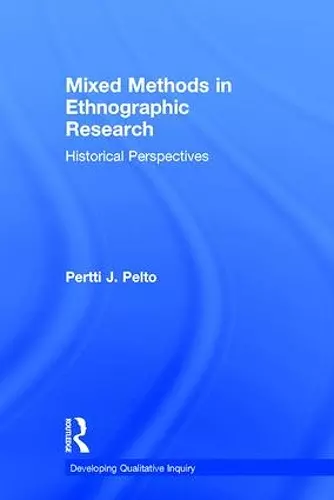Mixed Methods in Ethnographic Research
Historical Perspectives
Format:Hardback
Publisher:Left Coast Press Inc
Published:6th Mar '17
Currently unavailable, and unfortunately no date known when it will be back
This hardback is available in another edition too:
- Paperback£46.99(9781629582078)

Mixed Methods in Ethnographic Research: Historical Perspectives captures the dynamic history and development of mixed methods research in a narrative of personal discovery, growth, and experience. Distinguished ethnographer and methodologist Pertti Pelto, who first called for the integration of qualitative and quantitative research methods nearly half a century ago, establishes a direct line between the earliest examples of ethnographic research and the ongoing mixed method discussions in academic institutions throughout the world. By bringing together such distinct historical perspectives with his own reflections on mixed methods research, Pelto offers a rare and endlessly enriching account that will satisfy the ever-growing need for a better quality of practical data gathering and give researchers a foundation for promoting mixed methods in the future.
Prime architect of the methodology of employing mixed methods in ethnographic research, Pertti J Pelto, traces it's historical evolution globally. His personal narrative provides practical, experiential learnings for obtaining nuanced answers to complex research questions. Through decades of work with research networks and communities in India and other developing countries, Pelto succeeded in legitimizing the once suspect qualitative techniques. It is because of his untiring efforts that integrating qualitative with quantitative methods has become the norm today.
Saroj Pachauri, MD, PhD, DPH, Distinguished Scholar, Population Council
Only Pertti Pelto could have written this history –a tour de force of erudition. The book makes clear that anthropology is and has always been about mixed methods, but social scientists of all stripes will find wonderful material here for teaching mixed methods.
H. Russell Bernard, Professor Emeritus of Anthropology, University of Florida; Director of the Institute for Social Science Research, Arizona State University
In his latest book, Pertti Pelto takes us on a captivating, personal and historical tour of the use of mixed methods in social science research. His narrative style and stories from the from the field make this both a fun read and an important reference for students and researchers who want to gain a broader understanding of past and present developments in ethnographic research methods.
Patricia Hudelson, PhD, Anthropologue médicale, Consultation transculturelle et interprétariat, Département de médecine communautaire, de premier recours et des urgences, Hôpitaux Universitaires de Genève
In this immensely insightful, rich and readable ‘story’ of ethnographic research in the use of mixed methods, Professor Pelto reminds us how important is the historical perspective concerning research methods and strategies. In the absence of this clarity, social scientists and public health researchers are likely to polarize the discourse of qualitative versus quantitative methods and fail to take cognizance of various nuanced ways in which multi-method approaches enhance our knowledge creation. I can hardly overemphasize the timeliness of this book
Ravi Verma, PhD, Regional Director, Asia, International Center for Research on Women
Mixed Methods Research captures a wide and throughout picture of ethnographical research methods. It brings interestingly together the historical development and Pelto’s personal reflections on interaction of qualitative and quantitative research methods. Pelto’s wide experience of ethnographical research makes this book is an enjoyable reading and important guide for students as well as professional scholars all over the world. This book answers to a growing need for a practical guide in data-gathering.
Inker-Anni Linkola, Senior Officer, Sámi Archives, Sajos
Even in constructing his comprehensive and complex work on the application of mixed metholodologies, Pertti J. Pelto is a lively and engaging academic narrator, who succeeds to interpret deep issues and problems which have occupied generations of anthropologists. He weaves into the discussion his intensive long-term personal knowledge and experiences in multiple disciplines in various cultural settings, from the Skolt Sami in northernmost Europe to rural communities in South Asia. Pelto provides researchers and other actors, such as non-governmental organizations, with insights, strategies, and tools to apply mixed methodologies to health and social issues or economic and ecological understanding in an easily accessible manner."
Veli-Pekka Lehtola, Professor for Sámi cultural studies, Giellagas Institute, University of Oulu
ISBN: 9781629582061
Dimensions: unknown
Weight: 612g
356 pages